HARRY AGAINST EUSEBIO
It's Harry against Eusebio in the PEPS Hearing.
Harry Shields uses NVRX technology – the Neurographic Virtual Reality Experience – to re-live some of the most sordid events of our Primal history.
But as the hearing progresses, Eusebio hits back: he accuses Harry Shields and the d-humans of being the ones responsible for these atrocities of history.
|
REFLECTING WATER
But then it's time for the NVRX – a Neurographic Virtual Reality Experience. Eusebio is transported to Sand Creek, Colorado, on November 29, 1864. Only he's no longer Eusebio. He's temporarily experiencing life as a little Cheyenne girl called Reflecting Water. And the experience is unspeakable. "They've seared themselves into my memory," says Eusebio. "I know I'll never forget them as long as I'm alive." Because that clear, crisp morning in 1864 is defiled by the massacre of a defenseless Indian settlement , led by Colonel John Chivington and his 800 troops of the First Colorado Cavalry.
The NVRX is over and Harry is victorious: "Which soul is it, exactly, that the PEPS proposal would be eliminating?" he asks. "The soul of those brave white men who destroyed the American Indians, mutilating their corpses? Or the soul of the indigenous people? Because, if it's the latter, it seems the Primals have already done a damn good job of eliminating it already. And if it's the former… well, please explain to me what's worth saving." [Read the novel extract "Reflecting Water" in PDF or HTML] |
|
WARRIGAL KILLARA
Eusebio knows a lot about Uluru, because his Humanist community treasures the beliefs of the Australian aboriginals. Eusebio explains the Humanist view: "Their understanding of the world arose in an era when human beings were part of the earth from which we've evolved. An era before agriculture, when the human species had not yet begun to separate itself from its world. Their knowledge, passed down from one generation to the next, is the closest thing we have to an original human consciousness. It represents an understanding of our place in the universe from a time many thousands of years before any of the world's major religions were conceived"
"As they uttered words for animals, plants, mountains, water, each of these came into existence. Their actions formed the timeless landscape of what we now know as Australia. As they wandered across the terrain they were creating, singing the world into existence, they left trails behind them, known as songlines. The paths taken by the Creative Ancestors as they formed the world of the 'here and now'. "But the Creative Ancestors never went away. They grew tired of their work, and they merged their spirits into the land they had created. Some became part of the rocks and the hills; some became parts of the animals; some merged with the wind and the rain; others imbued themselves within the humans who were conceived in a particular Creative Ancestor's resting place. "So it was that the Aboriginals were part of the land they were conceived in, and shared it with their Creative Ancestors."
Only Warrigal Killara's soul wasn't saved. It was broken. Broken by the hypocrisy of the child-molesting teacher who had kidnapped him. Broken by the enforced Christianization of his name, his language, his life. And in the end, all Warrigal Killara had left was his booze. The NVRX is done and Harry's flush with victory. "I fail to understand," he crows to Naomi Aramovich, "how you can use any argument in defense of the Primals that relates to the specialness of their soul. I think we've established beyond a reasonable doubt that the Primals themselves had already done a magnificent job of eliminating anything special and sacred from those ethnic groups around the world that had maintained a link to the early forms of human consciousness." [Read the novel extract "Warrigal Killara" in PDF or HTML] |
|
THE ACCUSATION
But this time, Eusebio's figured out Harry's approach. He remembers how Harry accused him and his fellow Primals of the genocides carried out against the American Indians and the Australian aboriginals. "I sure as hell wasn't going to let him do this to me again," Eusebio tells us. "I wasn't going to be accused of murdering the millions of indigenous peoples whose lives and spirits were disemboweled at the hands of the Spanish conquest." So this time, Eusebio turns the tables. He accuses Harry Shields and his fellow d-humans of being responsible for it all.
What did Eusebio mean? How could the d-humans have done it when they weren't even around in those times? Eusebio's not sure, but he goes on anyway. He describes the gruesome massacres beginning in 1492 with Columbus' arrival on Hispaniola. How millions of Arawaks living peacefully on the island were completely wiped out in a generation. His anger takes over him as he accuses Harry and the d-humans of the gory atrocities carried out by the Spanish. He describes the mines at Potosi where " that caused the deaths of eight million tortured human beings over three centuries, far and away the greatest single site of human suffering the world has ever seen." Then, turning to Harry, calmer now, he says, " I accuse you, Harry Shields, and the countless, faceless, calm, civilized, Western-educated sophists just like you, of causing this crime against humanity, the greatest crime that the world has ever witnessed."
"I raised my hand and pointed my finger accusingly at Harry. "Yes, that's why, Harry Shields, I'm accusing you directly, you and everyone who's working behind the scenes to put you here, I'm accusing you and all the neatly trimmed, business-suited, clean, elegant, legalistic rationalizers and legitimizers of conquest, colonialism, capitalism and killing – I'm accusing you all of being party to the greatest conspiracy of genocide, destruction, and devastation of the human spirit, that the world has ever seen. There's no difference between you and Christopher Columbus, other than he was braver than you: he risked his life and was ready to watch the agony his victims felt when he cut them to pieces." [Read the novel extract "The Accusation" in PDF or HTML] |





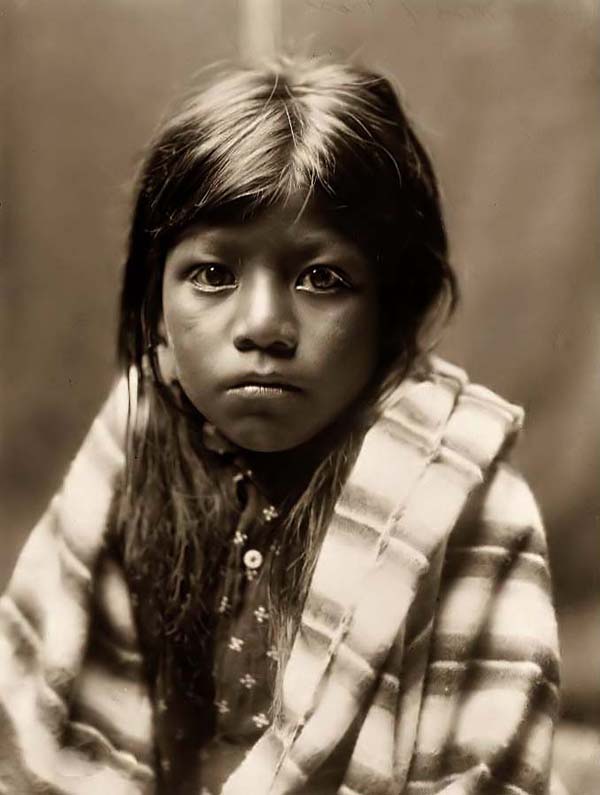 Eusebio's a history teacher, and when Harry Shields asks him to talk about the American Indians, he loses himself in his subject.
Eusebio's a history teacher, and when Harry Shields asks him to talk about the American Indians, he loses himself in his subject. 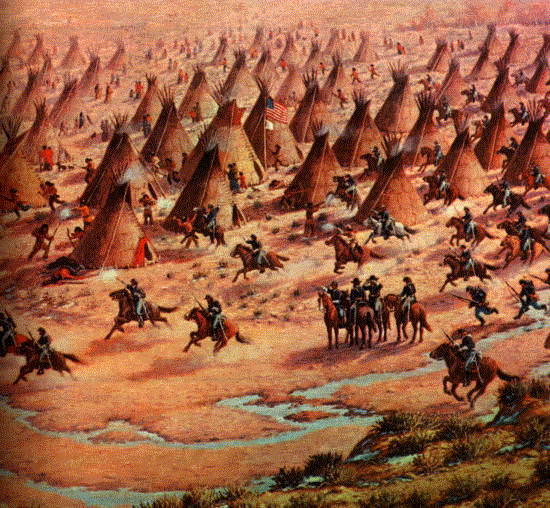 Reflecting Water's running from the soldiers when her big sister, Sun Behind Clouds, is shot down and falls on top of her. She feels her sister's blood dripping over her, slowly congealing. And then she watches with horror as her sister's corpse is mutilated by a drunk American soldier.
Reflecting Water's running from the soldiers when her big sister, Sun Behind Clouds, is shot down and falls on top of her. She feels her sister's blood dripping over her, slowly congealing. And then she watches with horror as her sister's corpse is mutilated by a drunk American soldier.
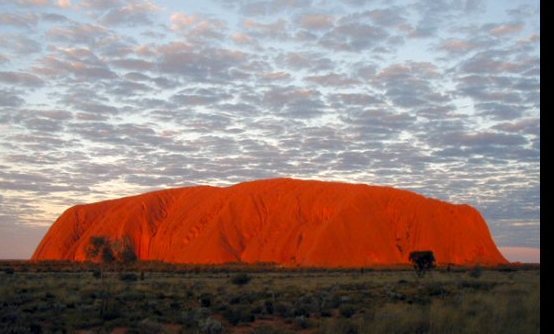 Another day, another genocide. When Eusebio's least expecting it, Harry Shields shows him a picture of
Another day, another genocide. When Eusebio's least expecting it, Harry Shields shows him a picture of 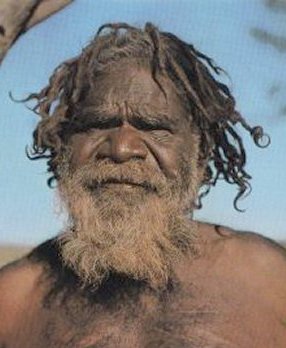 Eusebio tells Harry about the sacred world of the aboriginals:
Eusebio tells Harry about the sacred world of the aboriginals: 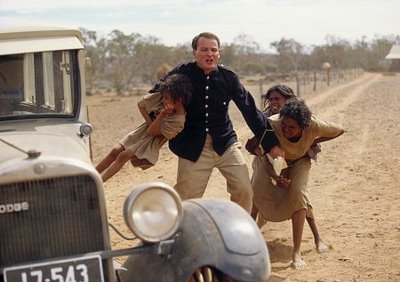 But then Harry's ready for another NVRX. This time, Eusebio's transported into the mind of an old aboriginal man called Warrigal Killara. Back into the 1960's. Warrigal Killara spends his time "pissed out of his mind" trying to forget. But he never succeeds. He tries to forget how, as a little 8-year-old boy, he was
But then Harry's ready for another NVRX. This time, Eusebio's transported into the mind of an old aboriginal man called Warrigal Killara. Back into the 1960's. Warrigal Killara spends his time "pissed out of his mind" trying to forget. But he never succeeds. He tries to forget how, as a little 8-year-old boy, he was 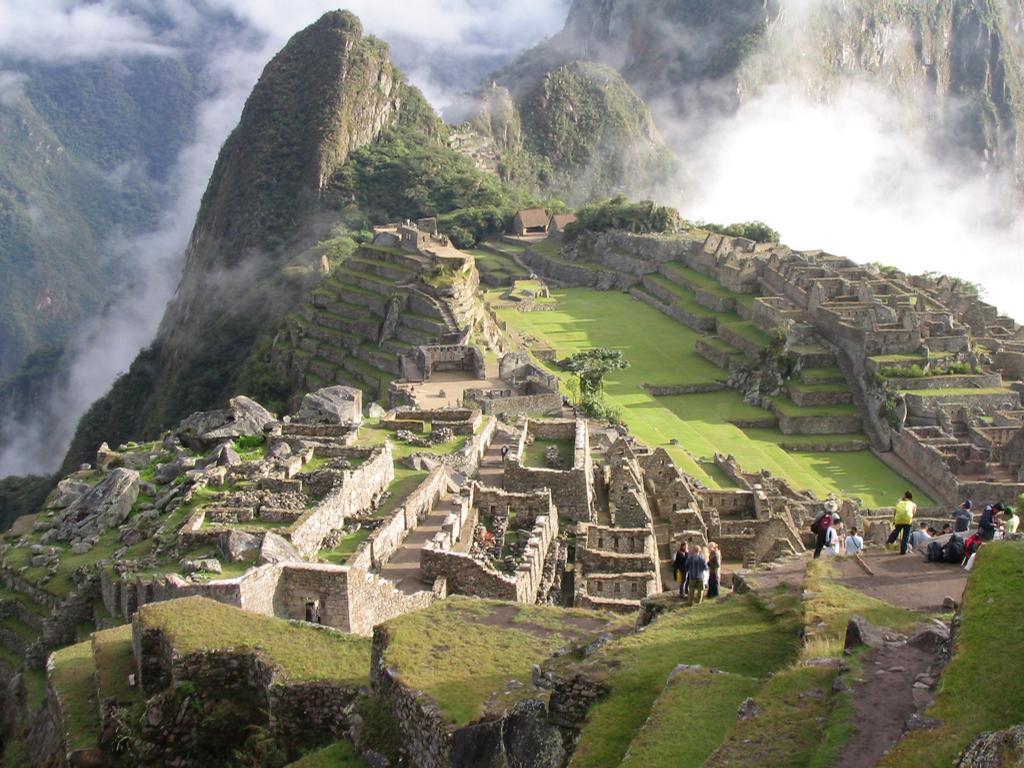 It's another day of the PEPS session. Harry begins with a picture of Machu Picchu, the mysterious and beautiful mountain settlement that had remained hidden from the Spanish for centuries, and was only discovered by American archaeologist Hiram Bingham in 1911.
It's another day of the PEPS session. Harry begins with a picture of Machu Picchu, the mysterious and beautiful mountain settlement that had remained hidden from the Spanish for centuries, and was only discovered by American archaeologist Hiram Bingham in 1911.
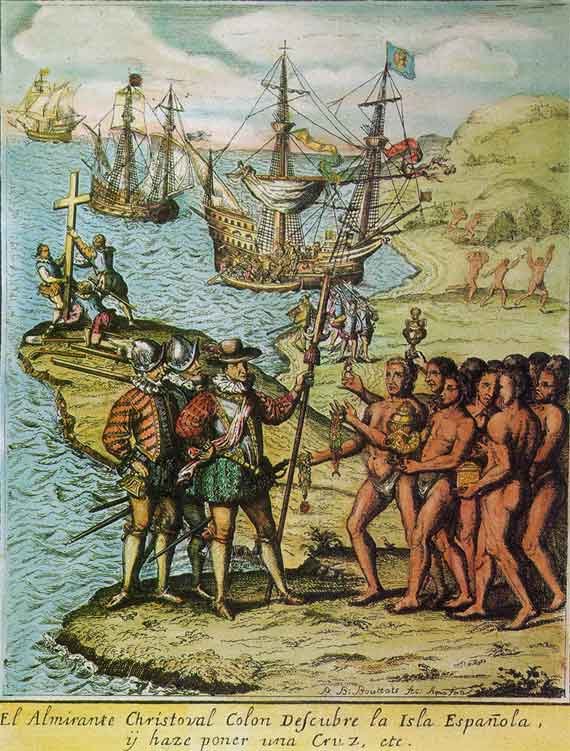 "It's not me and my race who did all those monstrous things," Eusebio yells back at Harry. "It's you, yes, it's people like you who did it all. People like you who were responsible for massacring millions upon millions of indigenous people in the Americas."
"It's not me and my race who did all those monstrous things," Eusebio yells back at Harry. "It's you, yes, it's people like you who did it all. People like you who were responsible for massacring millions upon millions of indigenous people in the Americas."
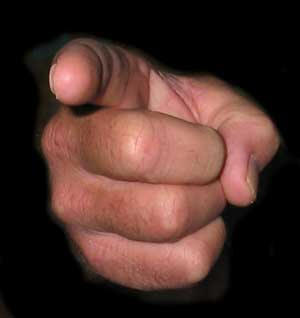 Finally, Eusebio realizes what he means. It's the mind-set, the calm dispassionate approach used to justify massacres and genocides in the name of Christianity, freedom or progress, that he's accusing. The very same mindset that Harry and his PEPS proposal is using to justify the extinction of the Primals. Finally, Eusebio gets it. Now he can put some meat into his accusation.
Finally, Eusebio realizes what he means. It's the mind-set, the calm dispassionate approach used to justify massacres and genocides in the name of Christianity, freedom or progress, that he's accusing. The very same mindset that Harry and his PEPS proposal is using to justify the extinction of the Primals. Finally, Eusebio gets it. Now he can put some meat into his accusation.